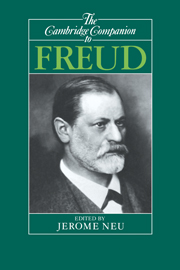Book contents
- Frontmatter
- Introduction
- 1 Freud: The psychoarcheology of civilizations
- 2 Seduced and abandoned: The rise and fall of Freud's seduction theory
- 3 Freud's androids
- 4 The interpretation of dreams
- 5 The unconscious
- 6 The development and vicissitudes of Freud's ideas on the Oedipus complex
- 7 Freud and perversion
- 8 Morality and the internalized other
- 9 Freud on women
- 10 Freud and the understanding of art
- 11 Freud's anthropology A reading of the “cultural books”
- 12 Freud's later theory of civilization
- 13 In fairness to Freud: A critical notice of The Foundations of Psychoanalysis, by Adolf Grünbaum
- Bibliography
- Cited works of Freud
- Index
- Series list
Introduction
Published online by Cambridge University Press: 28 May 2006
- Frontmatter
- Introduction
- 1 Freud: The psychoarcheology of civilizations
- 2 Seduced and abandoned: The rise and fall of Freud's seduction theory
- 3 Freud's androids
- 4 The interpretation of dreams
- 5 The unconscious
- 6 The development and vicissitudes of Freud's ideas on the Oedipus complex
- 7 Freud and perversion
- 8 Morality and the internalized other
- 9 Freud on women
- 10 Freud and the understanding of art
- 11 Freud's anthropology A reading of the “cultural books”
- 12 Freud's later theory of civilization
- 13 In fairness to Freud: A critical notice of The Foundations of Psychoanalysis, by Adolf Grünbaum
- Bibliography
- Cited works of Freud
- Index
- Series list
Summary
if often he was wrong and, at times, absurd, to us he is no more a person now but a whole climate of opinion under whom we conduct our different lives . . .
(W. H. Auden, In Memory of Sigmund Freud)Despite distorted understandings of Freud's views and despite periodic waves of Freud-bashing, Auden's assessment remains essentially correct. Freud's influence continues to be enormous and pervasive. He gave us a new and powerful way to think about and investigate human thought, action, and interaction. He made sense of ranges of experience generally neglected or misunderstood. And while one might wish to reject or argue with some of Freud's particular interpretations and theories, his writings and his insights are too compelling to simply turn away. There is still much to be learned from Freud.
The essays here collected focus on some of Freud's masterworks and some of his central concepts, trying to bring out the structure of his arguments and contributions to our self-understanding.
Freud was born in 1856 in Freiberg in Moravia, but after his family's move when he was four years old, he passed almost all of his long life in Vienna. The story of his life is the story of his thought. The great events were most often the occasions of his discoveries and speculations. After his childhood move, the rest of his life can be viewed as a tale of four cities, the psychogeography of which is explored by Carl Schorske. Vienna, embroiled in anti-Semitism, was the ambivalent scene of Freud's professional advances and defeats as well as home to his contented family life.
- Type
- Chapter
- Information
- The Cambridge Companion to Freud , pp. 1 - 7Publisher: Cambridge University PressPrint publication year: 1991

